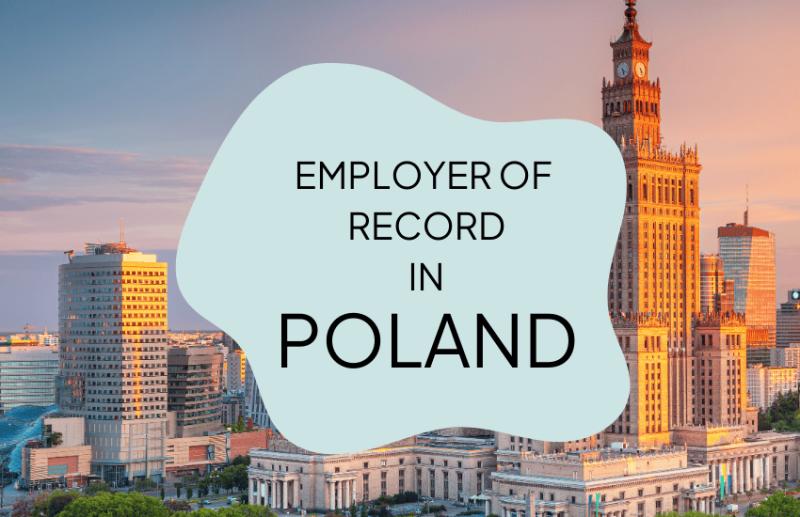Press release
Employer of Record (EOR) in Poland
Introduction to EOR in Poland
Expanding your business internationally can be both a profitable and exciting venture, but it also presents its challenges. Navigating labor laws, managing payroll, and ensuring compliance in a new country like Poland requires significant expertise and resources. This is where Employer of Record (EOR) services can make a big difference.
In this guide, we'll cover all the key aspects you need to know about using an Employer of Record in Poland!
For businesses aiming to enter markets like Poland, working with an EOR eliminates the lengthy and intricate process of creating a local entity. Instead, you gain immediate access to Poland's skilled workforce, while your EOR partner handles everything-from payroll and tax compliance to adhering to local employment laws. With an EOR by your side, the hiring process is smooth and fully compliant with local regulations, allowing you to focus on growing your team across borders.
Here you can find a much more in-depth guide on what an Employer of Record is here. https://eorquotes.com/what-is-an-employer-of-record-eor/
Here's why using EOR services in Poland can be a game-changer for your expansion:
Simplified Compliance
Navigating Poland's labor laws can be complex. EORs handle all compliance aspects, ensuring your business adheres to local regulations without a hitch. Labor laws and regulations can be difficult to follow, but having an EOR in Poland keeps you up to date and on track with legal requirements.
Cost-Effective Expansion
Setting up a local entity is expensive and time-consuming. EOR services offer a cost-efficient alternative by managing all employment responsibilities for you. This helps save both money and valuable resources, allowing you to focus on other aspects of your business.
Access to Polish Talent
Poland boasts a highly educated and skilled workforce. EOR services make it easier to hire and manage local talent without needing to set up a full HR department. This gives you immediate access to Poland's talent pool without the complexities of a traditional setup.
Administrative Relief
Managing payroll, taxes, and benefits in Poland can be overwhelming for companies unfamiliar with local procedures. EORs take care of these essential administrative tasks, giving you and your team the freedom to focus on core business activities without the headaches of local bureaucracy.
Risk Management
EORs take on the legal responsibilities tied to employment, significantly reducing your company's risk while ensuring smooth and compliant operations. By using an EOR in Poland, you can streamline your expansion and reduce risks, making the entire process faster and more efficient.
How Does EOR Service Work in Poland?
Using an Employer of Record (EOR) service in Poland simplifies the process of hiring and managing employees without the need for setting up a local entity or hiring a team of legal and HR experts. Here's how it works:
Consultation and Contracts
The EOR begins by understanding your business needs and then prepares employment contracts that comply with Polish labor laws.
Onboarding and HR Support
They handle everything from collecting necessary documents to setting up payroll, while also providing ongoing HR support to ensure smooth management of employee relations.
Payroll, Benefits, and Compliance
The EOR takes care of payroll, benefits, and guarantees full compliance with Poland's local laws, ensuring you don't have to worry about taxes or regulations.
Termination Handling
If required, the EOR will manage the termination process, making sure it is handled legally and fairly. Terminating an employee contract in Poland can be complicated if not done properly, so having an EOR to manage the legalities can save you time, effort, and potential costs.
Difference Between EOR and PEO
You may have heard of PEO (Professional Employer Organization) services before, but how do they compare to an Employer of Record (EOR)? While both models help businesses manage their human resources, there are key differences between the two that are important to understand.
The EOR is the Legal Employer
In Poland, the EOR acts as the legal employer, handling all employment-related legal and administrative duties, including payroll, taxes, and compliance with Polish labor laws. With a PEO, however, the client company remains the legal employer, while responsibilities like payroll and benefits management are shared between the company and the PEO provider.
To use a PEO you Need to Have an Entity in Poland
A PEO typically requires the client company to have a local entity in the country, whereas an EOR allows businesses to hire employees in countries where they do not have a legal presence.
The Services Provided are Different
Both EOR and PEO services in Poland offer payroll, benefits administration, and compliance management. However, for companies looking for a more hands-off approach-where the legal complexities are fully outsourced-an EOR in Poland is often the preferred option, especially for businesses expanding without establishing a permanent presence.
Learn more about the Difference between PEO and EOR
For a more detailed look at the differences between EOR and PEO, check out our article below. It provides key insights to help you decide which model is the best fit for your company's global hiring strategy. But keep in mind, a PEO service will only work if you have an entity in Poland!
Doing Business in Poland - A Detailed Overview
Poland, as a gateway to Central and Eastern Europe, is an excellent choice for companies looking to expand internationally. With its rapidly growing economy, skilled workforce, and a reputation for stability, Poland offers a business-friendly environment that supports growth and development.
Key Economic Overview
Poland's GDP reached approximately $780 billion in 2023, driven by strong industries such as manufacturing, IT, automotive, and financial services. The country enjoys a stable annual growth rate of 3.5%, and an inflation rate of 7.3% reflects ongoing efforts to balance economic growth with price stability. Poland is a major exporter in Europe, particularly in machinery, electronics, and furniture, benefiting from its central location and well-established trade links within the European Union.
Benefits of Doing Business in Poland
Poland's corporate tax rate, set at 19%, is competitive within the EU. The country's robust infrastructure-including high-quality road and rail networks, and an extensive digital infrastructure-ensures smooth business operations. Additionally, Poland actively promotes foreign investments and innovation, offering government incentives like grants, tax reliefs, and support for R&D initiatives, making it attractive for businesses involved in technology, renewable energy, and logistics.
Poland's Workforce and Employment Landscape
Poland has a highly educated, multilingual workforce, ideal for industries such as IT, engineering, manufacturing, and finance. The country's labor force exceeds 16 million, with particular strength in tech and manufacturing sectors. Poland's education system and vocational training programs have contributed to a highly skilled talent pool, making the country a growing hub for innovation and tech development in Europe. This combination of talent and competitive labor costs makes Poland a top destination for businesses looking to scale.
Working Hours and Leave Policies
In Poland, standard working hours are set at 40 hours per week, and employees are legally entitled to 20 days of paid annual leave if they have less than 10 years of experience. This increases to 26 days for employees with more than 10 years of work experience. Overtime is compensated at 150% of the regular wage for weekdays and 200% for weekends and public holidays.
Poland also has family-friendly leave policies. Parental leave can last up to 32 weeks, and it can be shared between both parents. In addition, maternity leave for mothers is 20 weeks, with 14 weeks being mandatory.
Labor Market and Contracts
In Poland, written contracts are required and must include crucial information such as the salary, job title, duties, and working hours. There are three main types of employment contracts: permanent, fixed-term, and trial contracts. A trial period contract in Poland typically lasts for up to three months.
The Polish Labor Code serves as the backbone for employment laws in the country, governing everything from employee rights to termination procedures. Unlike some other countries, Collective Bargaining Agreements (CBAs) are uncommon in Poland, as labor unions do not have widespread influence. Instead, employment regulations are largely shaped by statutory labor laws and internal company policies.
Payroll and Taxation in Poland
Poland has a progressive tax system, and payroll regulations are designed to support both employees and employers. The country uses a Pay-As-You-Earn (PAYE) system for taxation, ensuring that employers withhold taxes directly from employee wages. Income tax rates are 12% for annual income up to 120,000 PLN, and 32% for income beyond that.
In addition to tax obligations, employers and employees must contribute to social security and healthcare systems.
Employer Contributions
Employers in Poland are required to contribute between 19.21% and 22.41% of an employee's gross salary to the Social Insurance Institution (ZUS). The breakdown includes:
Pension Contributions: 9.76%
Disability Insurance: 6.5%
Sickness Insurance: 2.45%
Accident Insurance: 0.67% to 3.33%, depending on the risk level of the workplace
These contributions are vital for providing employees with access to pensions, healthcare, and unemployment benefits. The ZUS system in Poland is well-regulated, ensuring that workers are covered in cases of illness, injury, or retirement.
Employee Tax Obligations
Employees in Poland are taxed progressively, and they contribute 9% of their salary towards healthcare insurance. The healthcare system in Poland is comprehensive and ensures citizens have access to necessary medical care.
Additionally, employees must contribute to pension and disability funds, as well as unemployment insurance, providing a safety net in case of job loss or medical emergencies. In 2024, the social security contributions for employees include:
Pension: 9.76%
Health Insurance: 9%
Unemployment Insurance: 1.5%
Disability Insurance: 1.5%
Poland's welfare system ensures long-term security for employees and access to healthcare services through their mandatory contributions.
Employee Benefits in Poland
Poland's labor laws ensure that employees receive a wide range of benefits, contributing to a balanced work-life environment and providing comprehensive support for workers and their families. These benefits include paid leave, parental leave, sick leave, and more, aligning with Poland's commitment to social security and employee welfare.
Paid Leave and Public Holidays
Polish law entitles employees to 20 days of paid vacation annually if they have been employed for less than 10 years, or 26 days if they have more than 10 years of service. In addition, Poland observes 13 public holidays, including Christmas, Easter, and Constitution Day. Public holidays do not transfer to weekdays if they fall on weekends, except for January 1st (New Year's Day)
Parental Leave and Childcare Support
Poland offers a generous parental leave policy, allowing new parents to take up to 32 weeks of paid parental leave. This can be shared between both parents, and the leave can be taken flexibly. Mothers are entitled to 20 weeks of maternity leave, with 14 weeks being mandatory. Fathers are also granted two weeks of paternity leave. The system is designed to support working families, offering flexibility in how leave is used.
Sick Leave
In Poland, employees who are unable to work due to illness are entitled to 80% of their salary for the first 33 days (paid by the employer). For employees aged 50 and over, this period is shortened to 14 days. After this period, the Polish Social Insurance Institution (ZUS) steps in to provide sickness benefits, ensuring continued support during illness or injury.
Navigating the Hiring Process in Poland
Poland's hiring process is straightforward and transparent, with a strong focus on compliance with labor laws and fair treatment of employees. Employers often use job portals, recruitment agencies, and university partnerships to source talent. Poland's growing job market, particularly in sectors like IT, engineering, and manufacturing, provides ample opportunities for businesses to find skilled workers.
Ensuring Compliance through EOR Services in Poland
Hiring and managing employees in Poland requires strict compliance with local labor laws, tax regulations, and employment policies. Employer of Record (EOR) services, such as those offered by providers like Multiplier or Deel, help companies handle the complexities of hiring in Poland.
These EOR providers ensure full compliance with Polish labor laws by managing tasks such as payroll, taxes, contracts, and employee terminations. By taking on these responsibilities, EOR services reduce legal risks, save time, and allow businesses to focus on their core operations while ensuring they remain compliant with Polish regulations.
Simplifying Polish Work Culture and Language Barriers with EOR
Poland's work culture emphasizes professionalism, productivity, and transparency, which may be challenging for foreign businesses unfamiliar with local customs. An EOR provider helps navigate these cultural differences, ensuring smooth communication and compliance with local requirements-allowing you to focus on growing your business without worrying about language or cultural barriers.
Total Cost of Employment in Poland
When calculating the total cost of employment in Poland, employers must consider salaries, taxes, social security contributions, and additional benefits. These costs ensure that employees are well-supported, and companies can operate effectively within Poland's legal and social framework.
Typical Employer Costs
Employers in Poland should budget for approximately 19.21% to 22.41% on top of an employee's gross salary for social security contributions, which include:
Pension contributions
Health insurance
Disability and sickness insurance
Unemployment insurance
Accident insurance
In addition, employers should consider costs related to paid leave, overtime, and other contractual obligations under Polish labor laws.
Challenges of Hiring in Poland
While Poland offers a favorable environment for businesses, hiring in the country comes with its own set of challenges. Understanding these obstacles is essential for companies aiming to build and manage a successful workforce in Poland.
Key Hiring Challenges
Polish labor laws are strict, particularly around employment contracts, working hours, and employee rights. Employers must adhere to regulations on probation periods, notice periods, and termination processes, all governed by the Polish Labor Code. Unlike some other countries, Collective Bargaining Agreements (CBAs) are not widely used in Poland, but labor protections are comprehensive through statutory law.
Managing payroll can be complex due to mandatory employer contributions to social security, pensions, and other welfare benefits. However the EOR will take care of all of that for you.
Additionally, recruitment in Poland can be competitive, especially in high-demand industries like IT, engineering, and finance. Employers often need to conduct multi-step recruitment processes and thorough evaluations to secure the best talent in the market.
Cultural Considerations
Polish workplace culture emphasizes professionalism, productivity, and a balance between work and personal life. Maintaining a healthy work-life balance is important, and employers should also understand the significance of paid leave and parental benefits in Poland. Ensuring that employee expectations regarding sick leave, vacation, and flexibility are met is crucial for successful hiring and retention in the Polish market.
Benefits of Using an EOR in Poland
For companies expanding into Poland, partnering with an Employer of Record (EOR) simplifies the hiring process and ensures compliance with local laws. Here are the main advantages:
Risk Mitigation
By managing terminations, severance, and ongoing compliance, an EOR reduces the risk of employment disputes and legal penalties. They ensure adherence to Polish labor laws, protecting your company from potential liabilities.
Cost-Effectiveness
Using an EOR eliminates the need to establish a local entity, reducing operational costs. They handle payroll, social security, and tax contributions, streamlining administrative tasks while keeping your business compliant and controlling costs.
Fast Market Entry
An EOR allows companies to hire employees quickly without the delays of setting up a legal entity. They manage work permits, onboarding, and local compliance, allowing you to establish a presence in Poland swiftly and focus on growth.
Choosing the Right Employer of Record in Poland
Selecting the right Employer of Record (EOR) provider is crucial for ensuring a smooth expansion into Poland. Here are some important factors to consider:
Polish Labor Law Expertise
Ensure the EOR has a strong understanding of Polish employment laws, including tax regulations, social security, and worker protections, to avoid compliance issues.
Service Flexibility
Look for an EOR that offers a full range of services, including payroll, benefits administration, and contract management, tailored to your business needs.
Cost Transparency
Compare pricing models to ensure the EOR's services fit within your budget. Be sure that there are no hidden fees and that the cost structure aligns with your business size and operations.
Technology and Efficiency
Choose an EOR with a reliable platform that supports automated payroll, compliance tracking, and reporting. Scalable solutions will help your business expand smoothly.
Customer Support
Evaluate the EOR's customer support, ensuring they provide localized help in Poland with quick response times and support across time zones.
Local Presence
Working with an EOR that has a direct presence or partnerships in Poland provides deeper local insight and faster resolution of any regulatory issues.
Choosing the right EOR for your business in Poland is essential to ensure compliance, streamline operations, and support your growth plans. We've already listed some of the best EOR providers in Poland at the beginning of this article. All are highly reputable, but if we had to narrow it down to the top five, they are listed below in order of our ranking.
Top EOR Providers for Poland
Multiplier: Renowned for its extensive global employment services, providing tailored solutions for businesses expanding internationally. http://eorquotes.link/Multiplier
Deel: Features a highly intuitive platform that simplifies the process of hiring, onboarding, and managing international teams across various regions.
http://eorquotes.link/Deel
Conclusions
Expanding your business into Poland with the help of a trusted Employer of Record (EOR) is a smart and strategic decision. Our comprehensive guide explains how an EOR can simplify your entry into the Polish market by managing compliance, payroll, and HR tasks, while saving you time and resources. If you're ready to streamline your international expansion, selecting the right EOR provider is crucial.
At EORquotes.com, we've made it easy to find the perfect EOR partner for your needs. Our expert reviews and in-depth guides compare the top EOR providers, breaking down their services, pricing models, and customer feedback. Don't leave your expansion to chance-explore our detailed reviews to make an informed decision and secure the best deal available.
Let EORquotes.com guide you through a hassle-free selection process, so you can focus on growing your business while we handle the complexities of international hiring. Start now and find the best EOR provider for your business needs in Poland!
You can learn all you need to know about EOR, or get free quotes here
https://eorquotes.com/
EORquotes AB
Kungsgatan 22, Stockholm, Sweden
hello@EORquotes.com
EORquotes.com is the only unaffiliated, unbiased & free matchmaker when it comes to employer of record services.
Expanding your business internationally can be both a profitable and exciting venture, but it also presents its challenges. Navigating labor laws, managing payroll, and ensuring compliance in a new country like Poland requires significant expertise and resources. This is where Employer of Record (EOR) services can make a big difference.
In this guide, we'll cover all the key aspects you need to know about using an Employer of Record in Poland!
For businesses aiming to enter markets like Poland, working with an EOR eliminates the lengthy and intricate process of creating a local entity. Instead, you gain immediate access to Poland's skilled workforce, while your EOR partner handles everything-from payroll and tax compliance to adhering to local employment laws. With an EOR by your side, the hiring process is smooth and fully compliant with local regulations, allowing you to focus on growing your team across borders.
Here you can find a much more in-depth guide on what an Employer of Record is here. https://eorquotes.com/what-is-an-employer-of-record-eor/
Here's why using EOR services in Poland can be a game-changer for your expansion:
Simplified Compliance
Navigating Poland's labor laws can be complex. EORs handle all compliance aspects, ensuring your business adheres to local regulations without a hitch. Labor laws and regulations can be difficult to follow, but having an EOR in Poland keeps you up to date and on track with legal requirements.
Cost-Effective Expansion
Setting up a local entity is expensive and time-consuming. EOR services offer a cost-efficient alternative by managing all employment responsibilities for you. This helps save both money and valuable resources, allowing you to focus on other aspects of your business.
Access to Polish Talent
Poland boasts a highly educated and skilled workforce. EOR services make it easier to hire and manage local talent without needing to set up a full HR department. This gives you immediate access to Poland's talent pool without the complexities of a traditional setup.
Administrative Relief
Managing payroll, taxes, and benefits in Poland can be overwhelming for companies unfamiliar with local procedures. EORs take care of these essential administrative tasks, giving you and your team the freedom to focus on core business activities without the headaches of local bureaucracy.
Risk Management
EORs take on the legal responsibilities tied to employment, significantly reducing your company's risk while ensuring smooth and compliant operations. By using an EOR in Poland, you can streamline your expansion and reduce risks, making the entire process faster and more efficient.
How Does EOR Service Work in Poland?
Using an Employer of Record (EOR) service in Poland simplifies the process of hiring and managing employees without the need for setting up a local entity or hiring a team of legal and HR experts. Here's how it works:
Consultation and Contracts
The EOR begins by understanding your business needs and then prepares employment contracts that comply with Polish labor laws.
Onboarding and HR Support
They handle everything from collecting necessary documents to setting up payroll, while also providing ongoing HR support to ensure smooth management of employee relations.
Payroll, Benefits, and Compliance
The EOR takes care of payroll, benefits, and guarantees full compliance with Poland's local laws, ensuring you don't have to worry about taxes or regulations.
Termination Handling
If required, the EOR will manage the termination process, making sure it is handled legally and fairly. Terminating an employee contract in Poland can be complicated if not done properly, so having an EOR to manage the legalities can save you time, effort, and potential costs.
Difference Between EOR and PEO
You may have heard of PEO (Professional Employer Organization) services before, but how do they compare to an Employer of Record (EOR)? While both models help businesses manage their human resources, there are key differences between the two that are important to understand.
The EOR is the Legal Employer
In Poland, the EOR acts as the legal employer, handling all employment-related legal and administrative duties, including payroll, taxes, and compliance with Polish labor laws. With a PEO, however, the client company remains the legal employer, while responsibilities like payroll and benefits management are shared between the company and the PEO provider.
To use a PEO you Need to Have an Entity in Poland
A PEO typically requires the client company to have a local entity in the country, whereas an EOR allows businesses to hire employees in countries where they do not have a legal presence.
The Services Provided are Different
Both EOR and PEO services in Poland offer payroll, benefits administration, and compliance management. However, for companies looking for a more hands-off approach-where the legal complexities are fully outsourced-an EOR in Poland is often the preferred option, especially for businesses expanding without establishing a permanent presence.
Learn more about the Difference between PEO and EOR
For a more detailed look at the differences between EOR and PEO, check out our article below. It provides key insights to help you decide which model is the best fit for your company's global hiring strategy. But keep in mind, a PEO service will only work if you have an entity in Poland!
Doing Business in Poland - A Detailed Overview
Poland, as a gateway to Central and Eastern Europe, is an excellent choice for companies looking to expand internationally. With its rapidly growing economy, skilled workforce, and a reputation for stability, Poland offers a business-friendly environment that supports growth and development.
Key Economic Overview
Poland's GDP reached approximately $780 billion in 2023, driven by strong industries such as manufacturing, IT, automotive, and financial services. The country enjoys a stable annual growth rate of 3.5%, and an inflation rate of 7.3% reflects ongoing efforts to balance economic growth with price stability. Poland is a major exporter in Europe, particularly in machinery, electronics, and furniture, benefiting from its central location and well-established trade links within the European Union.
Benefits of Doing Business in Poland
Poland's corporate tax rate, set at 19%, is competitive within the EU. The country's robust infrastructure-including high-quality road and rail networks, and an extensive digital infrastructure-ensures smooth business operations. Additionally, Poland actively promotes foreign investments and innovation, offering government incentives like grants, tax reliefs, and support for R&D initiatives, making it attractive for businesses involved in technology, renewable energy, and logistics.
Poland's Workforce and Employment Landscape
Poland has a highly educated, multilingual workforce, ideal for industries such as IT, engineering, manufacturing, and finance. The country's labor force exceeds 16 million, with particular strength in tech and manufacturing sectors. Poland's education system and vocational training programs have contributed to a highly skilled talent pool, making the country a growing hub for innovation and tech development in Europe. This combination of talent and competitive labor costs makes Poland a top destination for businesses looking to scale.
Working Hours and Leave Policies
In Poland, standard working hours are set at 40 hours per week, and employees are legally entitled to 20 days of paid annual leave if they have less than 10 years of experience. This increases to 26 days for employees with more than 10 years of work experience. Overtime is compensated at 150% of the regular wage for weekdays and 200% for weekends and public holidays.
Poland also has family-friendly leave policies. Parental leave can last up to 32 weeks, and it can be shared between both parents. In addition, maternity leave for mothers is 20 weeks, with 14 weeks being mandatory.
Labor Market and Contracts
In Poland, written contracts are required and must include crucial information such as the salary, job title, duties, and working hours. There are three main types of employment contracts: permanent, fixed-term, and trial contracts. A trial period contract in Poland typically lasts for up to three months.
The Polish Labor Code serves as the backbone for employment laws in the country, governing everything from employee rights to termination procedures. Unlike some other countries, Collective Bargaining Agreements (CBAs) are uncommon in Poland, as labor unions do not have widespread influence. Instead, employment regulations are largely shaped by statutory labor laws and internal company policies.
Payroll and Taxation in Poland
Poland has a progressive tax system, and payroll regulations are designed to support both employees and employers. The country uses a Pay-As-You-Earn (PAYE) system for taxation, ensuring that employers withhold taxes directly from employee wages. Income tax rates are 12% for annual income up to 120,000 PLN, and 32% for income beyond that.
In addition to tax obligations, employers and employees must contribute to social security and healthcare systems.
Employer Contributions
Employers in Poland are required to contribute between 19.21% and 22.41% of an employee's gross salary to the Social Insurance Institution (ZUS). The breakdown includes:
Pension Contributions: 9.76%
Disability Insurance: 6.5%
Sickness Insurance: 2.45%
Accident Insurance: 0.67% to 3.33%, depending on the risk level of the workplace
These contributions are vital for providing employees with access to pensions, healthcare, and unemployment benefits. The ZUS system in Poland is well-regulated, ensuring that workers are covered in cases of illness, injury, or retirement.
Employee Tax Obligations
Employees in Poland are taxed progressively, and they contribute 9% of their salary towards healthcare insurance. The healthcare system in Poland is comprehensive and ensures citizens have access to necessary medical care.
Additionally, employees must contribute to pension and disability funds, as well as unemployment insurance, providing a safety net in case of job loss or medical emergencies. In 2024, the social security contributions for employees include:
Pension: 9.76%
Health Insurance: 9%
Unemployment Insurance: 1.5%
Disability Insurance: 1.5%
Poland's welfare system ensures long-term security for employees and access to healthcare services through their mandatory contributions.
Employee Benefits in Poland
Poland's labor laws ensure that employees receive a wide range of benefits, contributing to a balanced work-life environment and providing comprehensive support for workers and their families. These benefits include paid leave, parental leave, sick leave, and more, aligning with Poland's commitment to social security and employee welfare.
Paid Leave and Public Holidays
Polish law entitles employees to 20 days of paid vacation annually if they have been employed for less than 10 years, or 26 days if they have more than 10 years of service. In addition, Poland observes 13 public holidays, including Christmas, Easter, and Constitution Day. Public holidays do not transfer to weekdays if they fall on weekends, except for January 1st (New Year's Day)
Parental Leave and Childcare Support
Poland offers a generous parental leave policy, allowing new parents to take up to 32 weeks of paid parental leave. This can be shared between both parents, and the leave can be taken flexibly. Mothers are entitled to 20 weeks of maternity leave, with 14 weeks being mandatory. Fathers are also granted two weeks of paternity leave. The system is designed to support working families, offering flexibility in how leave is used.
Sick Leave
In Poland, employees who are unable to work due to illness are entitled to 80% of their salary for the first 33 days (paid by the employer). For employees aged 50 and over, this period is shortened to 14 days. After this period, the Polish Social Insurance Institution (ZUS) steps in to provide sickness benefits, ensuring continued support during illness or injury.
Navigating the Hiring Process in Poland
Poland's hiring process is straightforward and transparent, with a strong focus on compliance with labor laws and fair treatment of employees. Employers often use job portals, recruitment agencies, and university partnerships to source talent. Poland's growing job market, particularly in sectors like IT, engineering, and manufacturing, provides ample opportunities for businesses to find skilled workers.
Ensuring Compliance through EOR Services in Poland
Hiring and managing employees in Poland requires strict compliance with local labor laws, tax regulations, and employment policies. Employer of Record (EOR) services, such as those offered by providers like Multiplier or Deel, help companies handle the complexities of hiring in Poland.
These EOR providers ensure full compliance with Polish labor laws by managing tasks such as payroll, taxes, contracts, and employee terminations. By taking on these responsibilities, EOR services reduce legal risks, save time, and allow businesses to focus on their core operations while ensuring they remain compliant with Polish regulations.
Simplifying Polish Work Culture and Language Barriers with EOR
Poland's work culture emphasizes professionalism, productivity, and transparency, which may be challenging for foreign businesses unfamiliar with local customs. An EOR provider helps navigate these cultural differences, ensuring smooth communication and compliance with local requirements-allowing you to focus on growing your business without worrying about language or cultural barriers.
Total Cost of Employment in Poland
When calculating the total cost of employment in Poland, employers must consider salaries, taxes, social security contributions, and additional benefits. These costs ensure that employees are well-supported, and companies can operate effectively within Poland's legal and social framework.
Typical Employer Costs
Employers in Poland should budget for approximately 19.21% to 22.41% on top of an employee's gross salary for social security contributions, which include:
Pension contributions
Health insurance
Disability and sickness insurance
Unemployment insurance
Accident insurance
In addition, employers should consider costs related to paid leave, overtime, and other contractual obligations under Polish labor laws.
Challenges of Hiring in Poland
While Poland offers a favorable environment for businesses, hiring in the country comes with its own set of challenges. Understanding these obstacles is essential for companies aiming to build and manage a successful workforce in Poland.
Key Hiring Challenges
Polish labor laws are strict, particularly around employment contracts, working hours, and employee rights. Employers must adhere to regulations on probation periods, notice periods, and termination processes, all governed by the Polish Labor Code. Unlike some other countries, Collective Bargaining Agreements (CBAs) are not widely used in Poland, but labor protections are comprehensive through statutory law.
Managing payroll can be complex due to mandatory employer contributions to social security, pensions, and other welfare benefits. However the EOR will take care of all of that for you.
Additionally, recruitment in Poland can be competitive, especially in high-demand industries like IT, engineering, and finance. Employers often need to conduct multi-step recruitment processes and thorough evaluations to secure the best talent in the market.
Cultural Considerations
Polish workplace culture emphasizes professionalism, productivity, and a balance between work and personal life. Maintaining a healthy work-life balance is important, and employers should also understand the significance of paid leave and parental benefits in Poland. Ensuring that employee expectations regarding sick leave, vacation, and flexibility are met is crucial for successful hiring and retention in the Polish market.
Benefits of Using an EOR in Poland
For companies expanding into Poland, partnering with an Employer of Record (EOR) simplifies the hiring process and ensures compliance with local laws. Here are the main advantages:
Risk Mitigation
By managing terminations, severance, and ongoing compliance, an EOR reduces the risk of employment disputes and legal penalties. They ensure adherence to Polish labor laws, protecting your company from potential liabilities.
Cost-Effectiveness
Using an EOR eliminates the need to establish a local entity, reducing operational costs. They handle payroll, social security, and tax contributions, streamlining administrative tasks while keeping your business compliant and controlling costs.
Fast Market Entry
An EOR allows companies to hire employees quickly without the delays of setting up a legal entity. They manage work permits, onboarding, and local compliance, allowing you to establish a presence in Poland swiftly and focus on growth.
Choosing the Right Employer of Record in Poland
Selecting the right Employer of Record (EOR) provider is crucial for ensuring a smooth expansion into Poland. Here are some important factors to consider:
Polish Labor Law Expertise
Ensure the EOR has a strong understanding of Polish employment laws, including tax regulations, social security, and worker protections, to avoid compliance issues.
Service Flexibility
Look for an EOR that offers a full range of services, including payroll, benefits administration, and contract management, tailored to your business needs.
Cost Transparency
Compare pricing models to ensure the EOR's services fit within your budget. Be sure that there are no hidden fees and that the cost structure aligns with your business size and operations.
Technology and Efficiency
Choose an EOR with a reliable platform that supports automated payroll, compliance tracking, and reporting. Scalable solutions will help your business expand smoothly.
Customer Support
Evaluate the EOR's customer support, ensuring they provide localized help in Poland with quick response times and support across time zones.
Local Presence
Working with an EOR that has a direct presence or partnerships in Poland provides deeper local insight and faster resolution of any regulatory issues.
Choosing the right EOR for your business in Poland is essential to ensure compliance, streamline operations, and support your growth plans. We've already listed some of the best EOR providers in Poland at the beginning of this article. All are highly reputable, but if we had to narrow it down to the top five, they are listed below in order of our ranking.
Top EOR Providers for Poland
Multiplier: Renowned for its extensive global employment services, providing tailored solutions for businesses expanding internationally. http://eorquotes.link/Multiplier
Deel: Features a highly intuitive platform that simplifies the process of hiring, onboarding, and managing international teams across various regions.
http://eorquotes.link/Deel
Conclusions
Expanding your business into Poland with the help of a trusted Employer of Record (EOR) is a smart and strategic decision. Our comprehensive guide explains how an EOR can simplify your entry into the Polish market by managing compliance, payroll, and HR tasks, while saving you time and resources. If you're ready to streamline your international expansion, selecting the right EOR provider is crucial.
At EORquotes.com, we've made it easy to find the perfect EOR partner for your needs. Our expert reviews and in-depth guides compare the top EOR providers, breaking down their services, pricing models, and customer feedback. Don't leave your expansion to chance-explore our detailed reviews to make an informed decision and secure the best deal available.
Let EORquotes.com guide you through a hassle-free selection process, so you can focus on growing your business while we handle the complexities of international hiring. Start now and find the best EOR provider for your business needs in Poland!
You can learn all you need to know about EOR, or get free quotes here
https://eorquotes.com/
EORquotes AB
Kungsgatan 22, Stockholm, Sweden
hello@EORquotes.com
EORquotes.com is the only unaffiliated, unbiased & free matchmaker when it comes to employer of record services.
Permanent link to this press release:
Copy
Please set a link in the press area of your homepage
to this press release on woodPRI. woodPRI disclaims liability for any content contained in
this release.
Recommend

/newsMicroencapsulation Market Deep Analysis on Key Players - Dow Corning, Encapsys, Syngenta Crop Protection, Evonik Industries, 3M and Bayer
Market Study Report Adds Global Microencapsulation Market Size, Status and Forecast 2024 added to its database. The report provides key statistics on the current state of the industry and other analytical data to understand the market.
Extensive research is required for choosing the appropriate cor...

/newsGermany Airbag Market Size 2023: Global Share, Industry And Report Analysis By 2030 | Hyundai Mobis Co., Ltd. Key Safety Systems, Inc. Robert Bosch GmbH
Germany airbag market is expected to grow at a CAGR of around 6% during the forecast period. Germany Airbag Market research report refers to gathering and analyzing significant market data serve as best medium for various industry players to launch novel product or service. It is vital for key firms...

/newsSecurities Brokerages And Stock Exchanges Market Outlook 2021: Big Things are Happening
A new intelligence report released by HTF MI with title "Global Securities Brokerages And Stock Exchanges Market Survey & Outlook" is designed covering micro level of analysis by Insurers and key business segments, offerings and sales channels. The Global Securities Brokerages And Stock Exchange...

/newsRenewable Chemicals Market Emerging Trends and Competitive Landscape Forecast to 2028
The renewable chemicals market was valued at US$ 80,566.30 million in 2021 and is projected to reach US$ 1,76,750.76 million by 2028 it is expected to grow at a CAGR of 11.9% from 2021 to 2028. The research report focuses on the current market trends, opportunities, future potential of the market, a...

/newsHow Coronavirus is Impacting Cold Brew Coffee, Global Market Volume Analysis, Size, Share and Key Trends 2020-2026
"Market Latest Research Report 2020:
Los Angles United States, February 2020: The Cold Brew Coffee market has been garnering remarkable momentum in the recent years. The steadily escalating demand due to improving purchasing power is projected to bode well for the global market. QY Research's lates...

/newsCorporate E-Learning Market - Global Industry Size, Share, Key Players Analysis that are Infor, SkillSoft Corporation, Adrenna, CERTPOINT Systems and others with Regional Forecast to 2022
Overview:
E-Learning is used to enhance the learning procedures for newer job requirements and to make employees sound about the internal and external changes in the market and respective organizations. This method has created considerable differences in the ways of training and developing employee...
